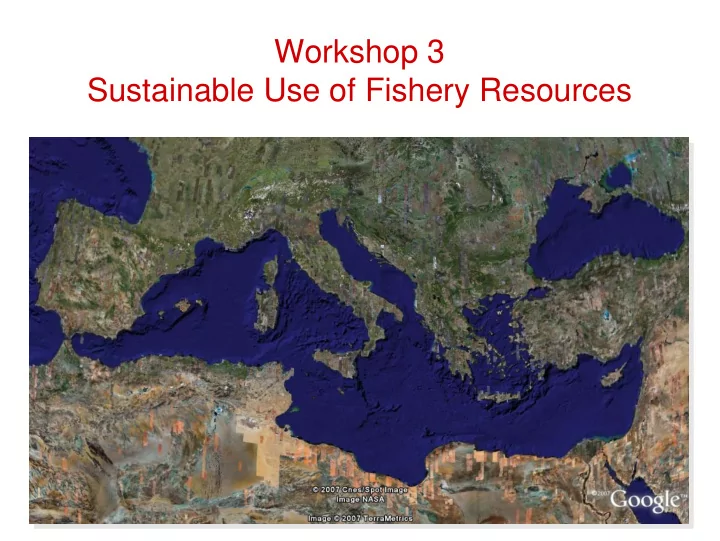

Workshop 3 General Fisheries Commission for the Mediterranean General Fisheries Commission for the Mediterranean Sustainable Use of Fishery Resources www.gfcm.org
Objectives and Functions The GFCM’s objectives are to promote the following, in the Mediterranean, Black Sea and connecting waters: • development, conservation, rational management of living marine resources • best utilization of living marine resources • sustainable development of aquaculture The principal functions of the GFCM are: • to coordinate efforts by governments to effectively manage fisheries at regional level following the Code of Conduct for Responsible Fisheries • to adopt binding recommendations for fisheries conservation and management in its Convention Area • to play a key role in fisheries governance in the Region • cooperate with other RFMOs and other International Organisations in matters of mutual interest
Structure and Functioning � The Commission holds its Regular Session on an annual basis, it implements its policy and activities through the Secretariat, based at its headquarters in Rome, Italy, and operates during the intersessional period by means of the following committees: • the Scientific Advisory Committee (SAC) Provides independent advice on the conservation and management of fisheries, considering biological, ecological, economic and social aspects. • the Committee on Aquaculture (CAQ) Monitors trends, promotes sustainable development and responsible management of marine and brackish water Aquaculture and provides related independent advice on technical, socio-economic, legal and environmental grounds. • the Compliance Committee (CoC) Reviews the compliance with conservation, management, monitoring, control, surveillance and enforcement measures adopted by the Commission, oversees the development and implementation of the GFCM Control and Inspection scheme and reviews issues such as IUU fishing in the Convention Area. • subsidiary committees of SAC, CAQ and CoC • other temporary, special or standing committees and working parties
Geographical Sub-Areas The GFCM endeavours to compile data, monitor fisheries and assess fisheries resources in a geo-referenced manner, through the use of 30 established Geographical Sub-Areas (GSAs)
GFCM (General Fishery Commission for the Mediterranean and its regional projects . At present fishery management in the area covered by the GFCM and its Scientific Advisory committee (SAC) is supported by 5 regional projects, which cover the whole Mediterranean: • 1. COPEMED II (Western Mediterranean) • 2. MEDSUDMED (Strait of Sicily and Central Mediterranean) • 3. ADRIAMED (Adriatic Sea) • 4. EASTMED (Ionian Sea, Aegean Sea, Straits of Dardanelles, Sea of Marmara, Bosphorus and Levantine Basin) to start soon. • 5. MEDFISIS (transversal project on standardisation of national fishery information systems)
The main objectives of the Regional projects are: • To strengthen scientific collaboration between the participating states; • To cooperate at regional level for the management of the sustainable fisheries in the Mediterranean; • To reinforce the scientific capacities of the non EU Mediterranean countries; • To support their contribution to the scientific activities recommended by the regional fisheries management bodies (GFCM and ICCAT); • To set up of a series of research programs on: artisanal fisheries, socio- economic indicators, sampling schemes, scientific surveys, etc.
These initiatives could be completed and strengthened by scheduling joint and additional specific projects particularly in the following fields:
The ecosystem-based approach to fishery analysis This approach should include: • bio-ecological parameters (reproduction, larval ecology, mortality, recruitment, prey-predators relationships, etc.); • socio-economic parameters; • environmental elements related to how the ecosystem operate. It is suggested to develop these case studies comparing areas exploited at different level of fishing pressure
The consolidation of national information systems of fishery data and their incorporation at regional level The collection of homogenous data at regional scale should be reinforced to allow the shared use of available data and information. This could be achieved through the elaboration of an information system on the exploited ecosystems, including socio-economic data, thus improving what is already realised by the MEDFISIS project
The improvement of fishing gear selectivity The need to experiment for various fishing techniques on system which reduce the capture of young fish is a concern shared by all Mediterranean countries. This can be achieved developing and strengthening the ATSELMED network of fishing technology researchers.
The issue of the ecologically sustainable fisheries is obviously linked to the topics developed by the other workshops. In particular: the challenges for the marine environment in the Mediterranean (Workshop 1) and the integrated management of the coastal zone (Workshop 4).
Recommend
More recommend